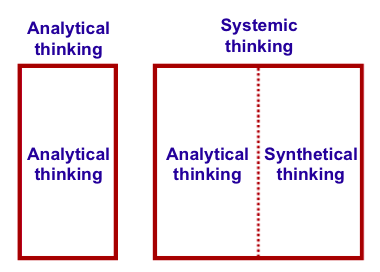What Is Systems Thinking?

Systems theory is one of the major breakthroughs in the understanding of organisations. It studies organisational systems from the perspective of the whole system, the various subsystems and the recurring patterns in the relationship between the subsystems. System theory has a great influence on how we understand and change organisational structure.
“Systems Thinking is the art and science of making reliable inferences about behavior by developing an increasingly deep understanding of underlying structure” – Barry Richmond, American systems scientist
Simply put, it is a management discipline that concerns an understanding of a system by examining the linkages and interactions between the components that made up the entire structure of a system. By setting sights on the system as an entity, company’s management can identify problems, also known as the ‘leverage points’, and conceptualise solutions. Accurately identifying leverage points can support constructive change.
Figure 1: Analytical Vs. Systemic Thinking[1]
The fundamental assumption of systems thinking is that everything is systemic – everything interacts with the things around it. In order to achieve a different outcome from a situation, management needs to think how to change the system that underpins the situation in a way that it delivers different output
A successful solution or strategy indicates that our mental paradigm (the model of the system in our mind) reflects the situation (the system) well. And a failed solution reflects the opposite.
Henceforth, systemic thinking is similar to troubleshooting our own mental paradigms as troubleshooting the situations we face.
Risk Management by Systems Thinking is a 2-day course that introduces systems science as way of being comprehensive while managing complexity. Through the course, participants will learn to see business and life as networks within natural systems and understand interrelation and interdependence with these natural systems, minimising risks. This course also aims to aid company’s management to manage their risks in a more profitable manner. For more information, please visit us at http://www.opuskinetic.com/training or contact us at info@opuskinetic.com.
Opus Kinetic believes that people are why organisations are successful, and giving people the knowledge to perform well at their job is integral for success. We pride ourselves as the premier provider of knowledge, offering acclaimed in-house training, leadership training courses, oil and gas training courses, courses that target health safety and environment, etc. Our training courses are well researched and updated with the latest industry trends. For more information on our professional training programs, you can visit us at http://www.opuskinetic.com/training.
[1] Figure is taken from Systemic Thinking – A Simple Thinking Technique for Gaining Systemic Focus by Gary Bartlett, Probsolv at The International Conference on Thinking “Breakthroughs 2001”.


